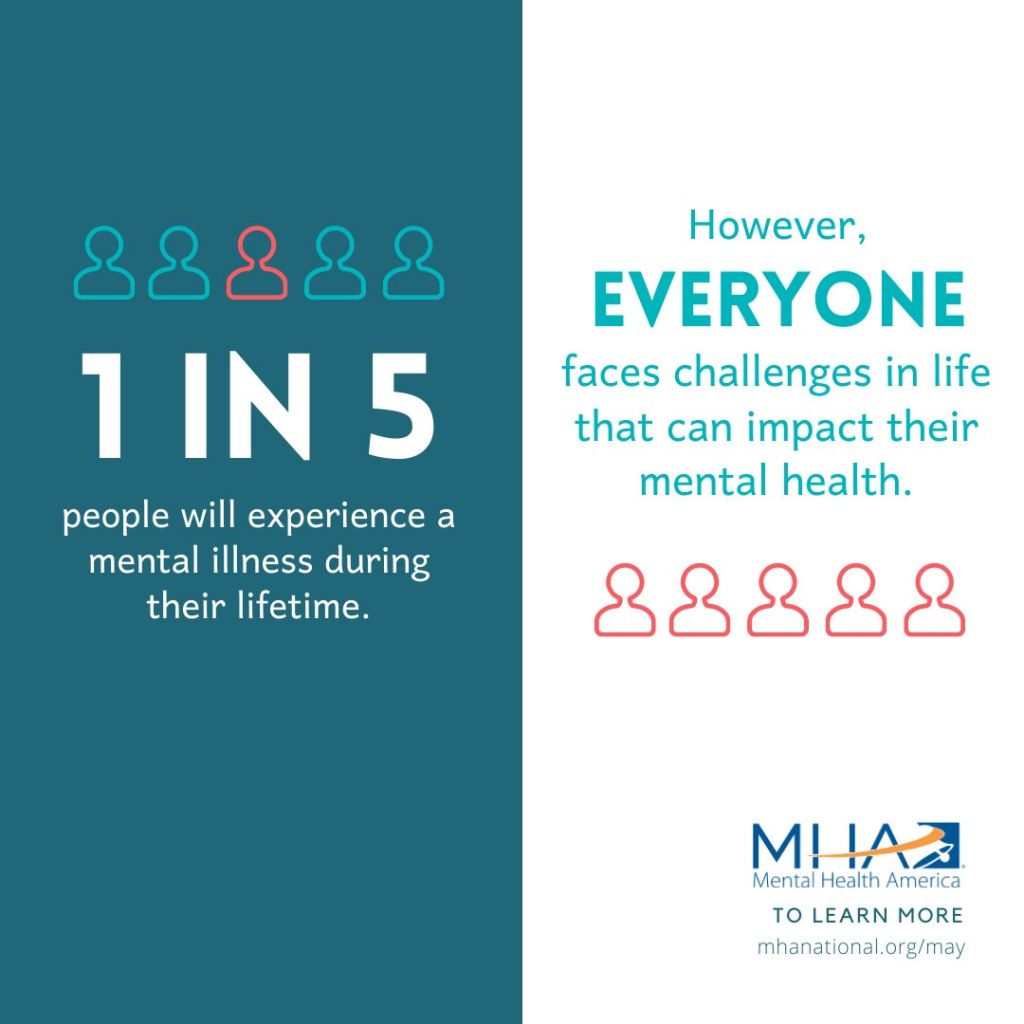Unveiling The Reality: Mental Health 1 In 5 – Join The Movement For A Better Tomorrow!
Mental Health 1 in 5: Understanding and Addressing the Prevalence of Mental Health Issues
Introduction
Hello Readers, today we will explore the topic of mental health and its prevalence in society. Mental health is a significant concern affecting a large portion of the population. According to recent studies, it is estimated that 1 in 5 individuals experience mental health issues at some point in their lives. In this article, we will delve into the various aspects of mental health, including its definition, causes, and available treatments. By understanding mental health better, we can work towards creating a more inclusive and supportive environment for everyone.
1 Picture Gallery: Unveiling The Reality: Mental Health 1 In 5 – Join The Movement For A Better Tomorrow!

What is Mental Health?
🧠 Mental health refers to a person’s emotional, psychological, and social well-being. It affects how individuals think, feel, and act, influencing their overall behavior and daily life. Having good mental health is crucial for maintaining healthy relationships, coping with stress, and making meaningful contributions to society.

Image Source: twimg.com
🧠 Mental health encompasses a wide range of conditions, including depression, anxiety, bipolar disorder, schizophrenia, and eating disorders. These conditions can have varying degrees of severity, impacting individuals differently.
🧠 Our mental health is influenced by a combination of biological, environmental, and genetic factors. Traumatic experiences, family history of mental health issues, and ongoing stressors can also contribute to the development of mental health conditions.
🧠 It is important to note that mental health issues are not a personal failing or weakness. They can affect anyone, regardless of age, gender, or background.
Who is Affected by Mental Health Issues?
🧠 Mental health issues do not discriminate and can affect individuals of all ages, races, and backgrounds. Although mental health problems can manifest differently in various populations, they are prevalent worldwide.
🧠 Research shows that certain groups may be more vulnerable to mental health issues, such as young adults, the elderly, individuals with low socioeconomic status, and those who have experienced traumatic events.
🧠 It is crucial to recognize the signs and symptoms of mental health issues in ourselves and others. By doing so, we can provide support and seek appropriate help when needed.
When Does Mental Health Issues Occur?
🧠 Mental health issues can arise at any stage of life, from childhood to old age. Some conditions, such as attention deficit hyperactivity disorder (ADHD), often appear in childhood, while others, like dementia, are more common in older adults.
🧠 It is essential to be aware of the potential triggers for mental health issues, such as major life changes, trauma, or chronic stress. These factors can increase the likelihood of developing mental health conditions.
🧠 Early intervention and proper treatment play a vital role in managing mental health issues. Recognizing the signs and seeking help promptly can prevent the condition from worsening and improve overall well-being.
Where Can Mental Health Issues Occur?
🧠 Mental health issues can affect individuals in various settings, including their homes, workplaces, schools, and communities. The impact of mental health problems extends beyond individual experiences, affecting families, friendships, and society as a whole.
🧠 Creating supportive environments that prioritize mental health is crucial for individuals to thrive. This includes promoting awareness, reducing stigma, and facilitating access to mental health resources and services.
Why is Mental Health Important?
🧠 Mental health is essential for overall well-being and is interconnected with physical health. Neglecting mental health can lead to a range of negative consequences, including reduced productivity, strained relationships, and diminished quality of life.
🧠 Furthermore, untreated mental health issues can increase the risk of developing physical health problems and exacerbate existing conditions. By addressing mental health, individuals can enhance their overall health and lead fulfilling lives.
How Can Mental Health Issues be Addressed?
🧠 Addressing mental health issues requires a multifaceted approach that involves individuals, communities, and policymakers. Here are some strategies that can help:
🧠 1. Increasing awareness and reducing stigma surrounding mental health.
🧠 2. Promoting early intervention and timely access to mental health services.
🧠 3. Providing support networks and resources for individuals affected by mental health issues.
🧠 4. Incorporating mental health education into school curriculums.
🧠 5. Advocating for policies that prioritize mental health and ensure equal access to mental health care.
🧠 By implementing these measures, we can create a more inclusive society that supports the mental well-being of everyone.
Advantages and Disadvantages of Addressing Mental Health Issues
🧠 Advantages:
1. Improved overall well-being and quality of life for individuals
2. Enhanced productivity and performance in various aspects of life
3. Strengthened relationships and social connections
4. Reduced healthcare costs associated with untreated mental health conditions
5. Prevention of potential long-term consequences
🧠 Disadvantages:
1. Stigma and discrimination may still persist despite efforts to raise awareness
2. Limited resources and accessibility to mental health services
3. The complexity of mental health issues may require ongoing support and treatment
4. Overreliance on medication without addressing underlying causes
5. Potential societal resistance to prioritizing mental health over other issues
Frequently Asked Questions (FAQ)
Q: Can mental health issues be prevented?
A: While it may not be possible to prevent all mental health issues, certain lifestyle choices and coping mechanisms can promote good mental health and reduce the risk of developing conditions.
Q: How can I support a loved one with mental health issues?
A: Offering emotional support, actively listening, and encouraging them to seek professional help are effective ways to support someone with mental health issues.
Q: Are there alternative treatments for mental health issues?
A: In addition to traditional treatment methods, alternative approaches such as therapy, mindfulness practices, and lifestyle changes can complement the overall management of mental health issues.
Q: Is it possible to recover fully from mental health issues?
A: Recovery from mental health issues varies for each individual. With proper treatment, support, and self-care, many individuals can lead fulfilling lives despite their condition.
Q: How can workplaces promote mental health?
A: Employers can create supportive work environments by implementing mental health policies, providing resources, and fostering a culture that prioritizes well-being and work-life balance.
Conclusion
🧠 Mental health issues affect a significant portion of our population. By understanding the prevalence and impact of mental health, we can work towards creating a more compassionate and supportive society. It is crucial to prioritize mental health, promote awareness, and ensure that everyone has access to the resources they need. Together, we can break the stigma surrounding mental health and build a more inclusive future.
Final Remarks
This article is intended for informational purposes only and should not replace professional medical advice. If you or someone you know is experiencing mental health issues, please seek assistance from a qualified healthcare professional. Remember, you are not alone, and help is available.
This post topic: Holistic Living
